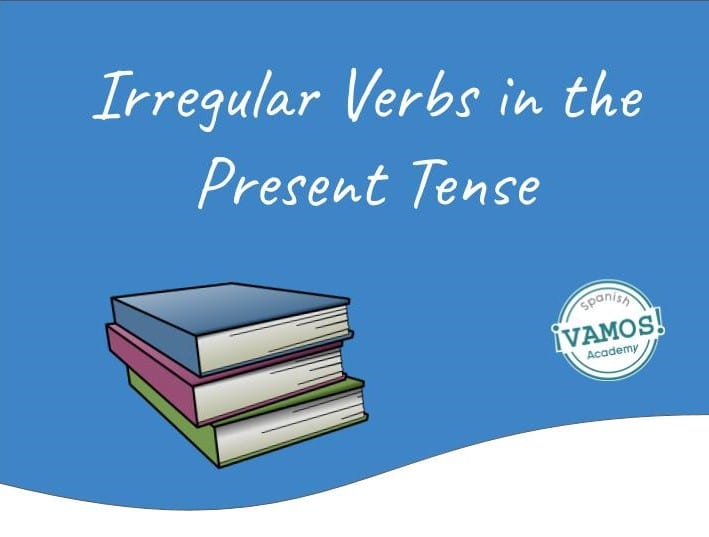Just like in English, the Spanish language has many irregular verbs. Fortunately for you, the majority of the irregular verbs in Spanish follow a pattern. Therefore, they are much easier to learn once you have learnt the rules when conjugating irregular verbs. With this supreme guide, you will be a master at conjugating irregular present tense verbs before you can say “Spanish”!
Remember, in Spanish, we have to conjugate all verbs according to the person, tense, voice and mood. Let’s get started!
If you remember from our previous lesson about regular verbs, there are three types of infinitives in Spanish: verbs that end in -ar, -er, or -ir. Infinitives are made up of two parts: the stem and the ending. Below you will notice that the stem is written in italics and the ending is in bold:
- Caminar
- Correr
- Vivir
With regular verbs, the stem does not change when it is conjugated.
| Persona | -AR | -ER | -IR |
| yo | camino | corro | vivo |
| vos | caminás | corrés | vivís |
| Tú | caminas | corres | vives |
| él/ ella/ usted | camina | corre | vive |
| nosotros/ nosotras | caminamos | corremos | vivimos |
| ustedes | caminan | corren | viven |
| ellos/ ellas | caminan | corren | viven |


With many verbs in Spanish, the stem changes when you conjugate them, and this is what makes them irregular. In the present tense, we have three main groups of stem changing verbs (with some other exceptions that we will talk about later):
The three main groups of stem changing verbs are as follows:
- e → ie
- e → i
- o → ue
Irregular Conjugations as Used in Argentina
| e → ie sentir | e → i pedir | o → ue poder | |
| yo* | siento | pido | puedo |
| vos | sentís | pedís | podés |
| él/ ella/ usted* | siente | pide | puede |
| nosotros/ nosotras | sentimos | pedimos | podemos |
| ustedes* | sienten | piden | pueden |
| ellos/ ellas* | sienten | piden | pueden |
*You will notice in the above chart that the stem changes in the first person, third person singular and third person plural forms. That is to say: yo, él/ ella/ usted, ustedes y ellos/ ellas.
Irregular Conjugations as Used in Spain:
| e → ie sentir | e → i pedir | o → ue poder | ||
| yo* | siento | pido | puedo | |
| tú | sientes | pides | puedes | |
| él/ ella/ usted* | siente | pide | puede | |
| nosotros/as | sentimos | pedimos | podemos | |
| Vosotros/as | sentís | pedís | podéis | |
| ustedes* | sienten | piden | pueden | |
| ellos/ ellas* | sienten | piden | pueden |
*Here you will notice that the stem changes in the first person, second person (which we can notice is different than the vos form used in Argentina which is not considered irregular), third person singular and third person plural forms. That is to say: yo, él/ ella/ usted, ustedes y ellos/ ellas.
Below is a list of common stem changing verbs in Spanish:
| e → ie | e → i | o → ue |
| calentar, empezar, despertar, mentir, sentir, perder, entender, querer | medir, reír, despedir, impedir, vestir, repetir, servir | contar, costar, dormir, encontrar, volver, soñar, recordar, volar |
Now that we have learned about basic stem changing verbs, we can take a look at some of the exceptions that we talked about earlier.
‘Irregulares Totales’ or Total Irregulars:
| ser | ir | |
| yo* | soy | voy |
| vos* | sos | vas |
| tu* | eres | vas |
| él/ ella/ usted* | es | va |
| nosotros/as* | somos | vamos |
| vosotros/as* | sois | vais |
| ustedes* | son | van |
| ellos/ ellas* | son | van |
Audio for the conjugation of the verb ser in Argentina:
Audio for the conjugation of the verb ir in Argentina:
Audio for the conjugation of the verb ser in Spain:
Audio for the conjugation of the verb ir in Spain:
Now we are going to take a look at irregular verbs that only change their stems in the first person singular. There are three different changes that we make when conjugating these irregular verbs in the first person singular.
In the first category, we change the ending to y:
| dar | estar | |
| yo* | doy | estoy |
In the second category, we change the stem to g.
| hacer | valer | poner | salir | caer | traer | |
| yo* | hago | valgo | pongo | salgo | caigo | traigo |
In the third category, we change the stem to zc.
| parecer | agradecer | conocer | traducir | producir | conducir | |
| yo* | parezco | agradezco | conozco | traduzco | produzco | conduzco |
Now that we have seen irregular stem changing verbs and total irregular verbs, we are going to take a look at the “irregulares mixtos” or mixed irregular verbs.
When dealing with ‘irregulares mixtos’ in Argentina, a -g is added when conjugating in the first person singular, and stem changes in the third person singular and plural.
Take a look at the examples below:
| tener | venir | decir | oír | |
| yo* | tengo | vengo | digo | oigo |
| vos | tenés | venís | decís | oís |
| él/ella/usted* | tiene | viene | dice | oye |
| nosotros | tenemos | venimos | decimos | oímos |
| ustedes* | tienen | vienen | dicen | oyen |
| ellos/ellas* | tienen | vienen | dicen | oyen |
When in Spain, the same rules apply for ‘irregulares mixtos’ as in Argentina, but we must must also implement a stem change when talking in the second person, tú:
| Tener | Venir | Decir | Oír | ||
| yo* | tengo | vengo | digo | oigo | |
| tú | tienes | vienes | dices | oyes | |
| él/ella/usted* | tiene | viene | dice | oye | |
| nosotros/as | tenemos | venimos | decimos | oímos | |
| vosotros/as | teneís | venís | decís | oís | |
| ustedes* | tienen | vienen | dicen | oyen | |
| ellos/ellas* | tienen | vienen | dicen | oyen |
Finally, we are going to look at irregular stem changing verbs with y
In Argentina, the stem changes to -y in the first, third person singular, and third person plural form:
| huir | construir | sustituir | incluir | |
| yo* | huyo | construyo | sustituyo | incluyo |
| vos | huís | construís | sustituís | incluís |
| él/ella/usted* | huye | construye | sustituye | incluye |
| nosotros | huímos | construímos | sustituímos | incluímos |
| ustedes* | huyen | construyen | sustituyen | incluyen |
| ellos/ellas* | huyen | construyen | sustituyen | incluyen |
In Spain, the stem changes to -y in the first person, second person, and third person singular and plural:
| Huir | Construir | Sustituir | Incluir | |
| yo* | huyo | construyo | sustituyo | incluyo |
| tú | huyes | construyes | sustituyes | incluyes |
| él/ella/usted* | huye | construye | sustituye | incluye |
| nosotros/as | huímos | construímos | sustituímos | incluímos |
| vosotros/as | huís | construís | sustituís | incluís |
| ustedes* | huyen | construyen | sustituyen | incluyen |
| ellos/ellas* | huyen | construyen | sustituyen | incluyen |
Ser – to be
Yo soy de España. (I am from Spain.)
Tú eres muy inteligente. (You are very smart.)
Él es mi amigo. (He is my friend.)
Nosotros somos felices. (We are happy.)
Ellos son estudiantes. (They are students.)
Estar – to be
Yo estoy enfermo. (I am sick.)
Tú estás cansado. (You are tired.)
Él está en la oficina. (He is in the office.)
Nosotros estamos en casa. (We are at home.)
Ellos están en la escuela. (They are at school.)
Tener – to have
Yo tengo hambre. (I am hungry.)
Tú tienes frío. (You are cold.)
Él tiene un perro. (He has a dog.)
Nosotros tenemos
And that’s it! Now you just need to practice


With a little bit of practice, you will be an expert in no time! And if you have any doubts, be sure to join us at any of our schools but especially our Spanish School in Toronto!
Share this post!
Start your Spanish Immersion Experience Today. We offer both In-Person and Online Spanish Classes. Discover Our Malaga School or our Buenos Aires School. No matter your plans VAMOS Academy has a course for you!
Join the conversation on social:
RELATED ARTICLES:
How to Use BIEN and BUENO or muy bien and muy bueno: University Guide
Is it surprising that even native English speakers wrestle with “good” versus “well”? This…
Saber and Conocer Explained: The How, Why, When, and Where Guide
Saber vs Conocer – How and When to Use Them Have you ever done…
10+ Reasons to Learn Spanish in Malaga
Did you know that Málaga is a jewel of the Spanish coast? It’s also…
Argentina National Holidays Calendar 2024 Overview
One key holiday is May 25th, Argentina’s Independence Day, marking 202 years since freedom…




